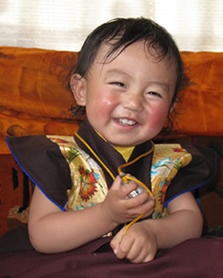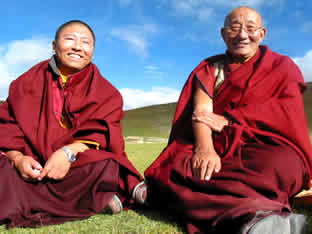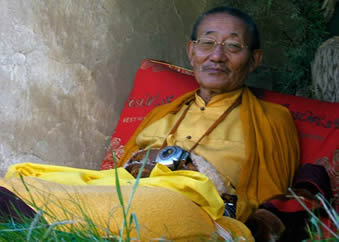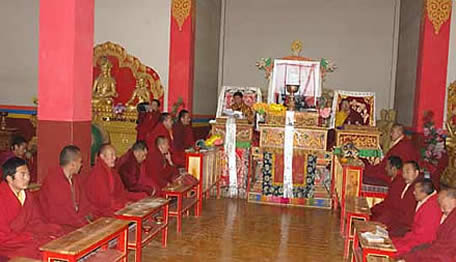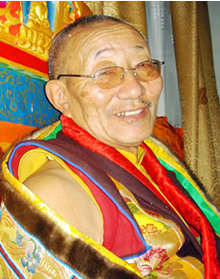 The Eighth Adeu Rinpoche was one of my (Tsoknyi Rinpoche) root gurus; he passed away at Tsechu, his monastery in Nangchen, Tibet, in July, 2007. Adeu Rinpoche was renowned as one of the great Tibetan Buddhist masters of the 20th century [Click here for full biography]. He was identified by His Holiness the 16th Karmapa and enthroned at the age of seven; his extensive Dharma studies included the entire teachings of the Drukpa Kagyu lineage, and during his many years of retreat he mastered the Six Yogas of Naropa, as well as the teachings of Mahamudra.
The Eighth Adeu Rinpoche was one of my (Tsoknyi Rinpoche) root gurus; he passed away at Tsechu, his monastery in Nangchen, Tibet, in July, 2007. Adeu Rinpoche was renowned as one of the great Tibetan Buddhist masters of the 20th century [Click here for full biography]. He was identified by His Holiness the 16th Karmapa and enthroned at the age of seven; his extensive Dharma studies included the entire teachings of the Drukpa Kagyu lineage, and during his many years of retreat he mastered the Six Yogas of Naropa, as well as the teachings of Mahamudra.
With the Cultural Revolution reaching Nangchen, Tsechu Gonpa was destroyed, and Adeu Rinpoche was sent to prison for 15 years, where he met and received teachings from many great lamas. After his release, Adeu Rinpoche worked tirelessly to rebuild Tsechu Gonpa, and to revive the Drukpa Kagyu lineage, which he transmitted many times. He also gave the entire treasure teachings of Ratna Lingpa, which are the foundation of the Tsoknyi lineage.
Because of the deep historical connection between the Tsoknyi lineage and Tsechu Gonpa, I spent the year 1986 with him there, where we developed a profound master-student relationship. Over the years that followed, we engaged in several meaningful Dharma projects, and I received invaluable teachings from him. His death was an enormous loss to the Dharma, and to me.
When I was in Nangchen Gar (the site of Tsechu Monastery), right after he had passed away, I met with Choegon Rinpoche (the previous Choegon was Adeu Rinpoche’s teacher, and the current Choegon his student), as well as with Tsaltrul Rinpoche, Adeu Rinpoche’s nephew. The three of us talked over how we could use the traditional methods to look for Adeu Rinopche’s tulku.
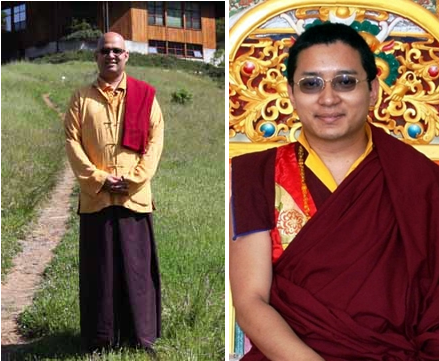
One year later I got a call from a khenpo at Tsechu Gonpa, who told me that a yogi in three-year retreat there had a letter that Adeu Rinpoche had given him. The yogi said that Adeu Rinpoche had told him, “This letter will be important for the monastery in the future.” I asked the khenpo to fax me the letter. In the letter, Adeu Rinpoche had written, “Tsaltrul Rinpoche will be my Dharma successor and tulku successor,” implying that Adeu would be reborn in his family. I showed the letter to Choegon Rinpoche, who through his meditation confirmed that this meant the Adeu tulku was Tsaltrul’s infant son.

As I was getting ready to go to Tibet, Shedrup Nyima, the reincarnation of my first root teacher Khamtrul Rinpoche (head of the Eastern Drukpa Kagyu tradition), came to Nepal. When I told him where I was going, he gave me a special protection cord for the yangsi (as tulkus are called until they are enthroned).
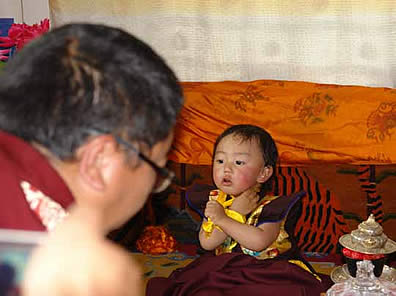
Choegen had sent me a confirmation letter and long-life prayer, which I brought to Nangchen. There in a ceremony at Tsechu Gonpa, I read both letters to a joyous assembly of monks.

As it turned out, before he died, Adeu Rinpoche had told several older monks and his niece he would be reborn into the same family – and told Tsaltrul, “If I have the power, I will be born as your son.”

Apart from this, many people in Nangchen were already expecting my announcement before the letter was discovered because of the miraculous signs that occurred when the baby was born. On the day of his birth, many people had seen auspicious signs at the monastery, the birth hospital, and Tsaltrul’s house. (I have asked a khenpo there to gather the list of all these signs, which I will tell you about another time.) From the time this baby boy was born – and long before the announcement he was a tulku — local people have come to prostrate and give him offerings.
Circumstances had kept me from getting to Tibet immediately after I had received the letter from the khenpo. But I was very eager to see the boy. I finally arrived at his house in Yushu and went to see the yangsi. His parents had warned me that when he sees a stranger, he was often shy or might cry. But the first moment he saw me, there was a feeling of recognition, and the sense he already knew me. He came to me immediately. I had goose bumps.
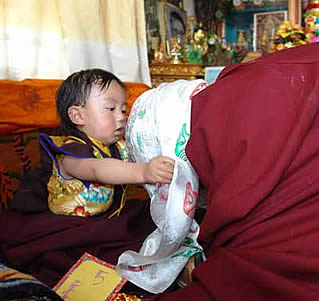
Half an hour later, 30 senior monks, Tsaltrul Rinpoche, and the little yangsi’s grandfather (also a Rinpoche) had gathered at the house. For the next hour we chanted the mantras for a cleansing ceremony.
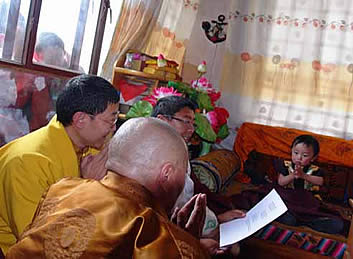
The yangsi was being held by his mother, and I thought he would be happier in her arms. But then I saw he was reaching for me, so I took him in my lap, where he stayed, contented, during the next half hour of chants. He nestled in my arms as though he were one of my own children. As he did this, many monks started to cry, and I almost wept, too.


